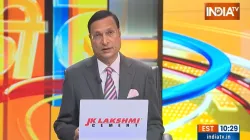OPINION | Deport all illegal Bangladeshi migrants
The crackdown on Bangladeshis in Delhi comes after the Lt. Governor directed the police chief to launch a two-month drive to identify Bangladeshi nationals. A joint team of Assam and Bengal police also nabbed eight Bangladeshis.

The busting of a gang engaged in a Bangladeshi immigration racket in Delhi and the arrest of eight Ansarullah Bangla Team terrorist module members from Bengal and Kerala raise serious concerns about the influx of people from the neighbouring country. In Delhi, 11 persons including five Bangladeshis were arrested on a charge of forging documents to generate Aadhar and voters' identity cards for foreigners.
The crackdown on Bangladeshis in Delhi comes after the Lt. Governor directed the police chief to launch a two-month drive to identify Bangladeshi nationals. Fake Aadhar cards and other certificates were being sold by this gang for Rs 20. Among those arrested are Aadhar card operators and document forgers. Most of these Bangladeshis, after getting Aadhar and voter identity cards, get all welfare scheme benefits from the government.
Meanwhile, a joint team of Assam and Bengal police nabbed eight Bangladeshis who were acting as members of the Ansarullah Bangla Team sleeper terror module. They were arrested from Kerala and Bengal. The busting of the Ansarullah Bangla Team terror module is more serious. Their mastermind, Shahab Sheikh, was first caught in Kerala, and after getting clues, the Assam-Bengal joint police team raided Dhubri in Assam, and Khidirpur and Murshidabad in Bengal, to nab the other members of the module. Shahab Sheikh had been living in India for the last ten years. In the meantime, he visited Bangladesh several times. Police sources say the module planned to kill leaders of RSS and other pro-Hindutva outfits in India.
Maharashtra Chief Minister Devendra Fadnavis has announced that a state-wide drive would be launched to identify illegal Bangladeshi immigrants and those arrested would be kept at detention centres before deportation.
Already, with Delhi assembly polls due, the issue of detection of illegal Bangladeshis living in the capital has become not only legal and technical but political too. Muslims coming from Bangladesh to Delhi were vote banks of the Congress party and most of them are now supporters of the Aam Aadmi Party. AAP chief Arvind Kejriwal has been raising questions as to how Bangladeshis, who crossed the Bengal border reached Delhi, since border security rests with the Centre.
Normally, in India, whenever the issue of illegal Bangladeshi migrants arises, these foreign nationals are viewed by some political parties as vote banks. The issue has now wider and serious ramifications. In 2004, the Centre informed Parliament that there were an estimated two crore Bangladeshi infiltrators in India, out of which six lakhs were in the National Capital Region. In 2013, the UPA government had also given similar data about illegal Bangladeshi migrants.
There had been no serious campaign by the Centre or state governments to identify Bangladeshi infiltrators and pushing them back. In a striking contrast, Bangladeshi immigrants cross over with ease into India, while Indian authorities face legal difficulties in ensuring their deportation.
Identification of illegal migrants is the work of investigation agencies. Since most of the illegal migrants do not have genuine documents, it is difficult to establish them as infiltrators. This has been going on for decades. In Mumbai, 686 Bangladeshi migrants were arrested in the last three years, out of which only 222 migrants were deported. The cases of the remaining migrants are pending in courts.
Illegal Bangladeshi migrants enter India, settle here, obtain Indian identity cards through fraudulent means and get benefits from all welfare schemes. Several of them have been found to be involved in criminal activities, but since police do not have their crime records, it is difficult to nab them. Ultimately, they become a headache for society and the police. Political leaders should stop politicising this infiltration issue and support the government and its investigation agencies to ensure that illegal immigrants from Bangladesh are deported at the earliest.
Aaj Ki Baat: Monday to Friday, 9:00 pm
India's Number One and most followed Super Prime Time News Show 'Aaj Ki Baat- Rajat Sharma Ke Saath' was launched just before the 2014 General Elections. Since its inception, the show has redefined India's super-prime time and is numerically far ahead of its contemporaries. Aaj Ki Baat: Monday to Friday, 9:00 pm.